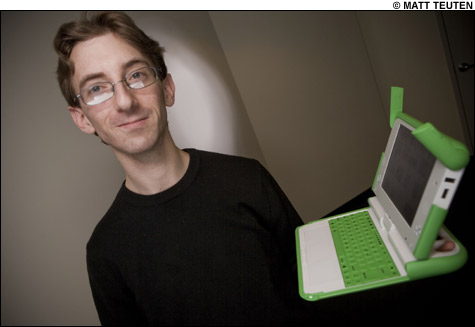
DIEHARD WITH A LAPTOP: Long-time Wikipedia contributor SJ Klein used to spend 20 to 30 hours per week editing the site, posting updates in English, German, and the Uto-Aztecan language of Nahuatl. |
The ancient Library at Alexandria, once the largest on Earth, housed perhaps 500,000 volumes. Most were procured when Egypt’s Ptolemy III decreed that each visitor to the city had to hand over every book and scroll in his or her possession, regardless of subject matter or language. These texts were then copied by scribes, the facsimiles shelved in the library, and the originals returned to their owners. At least that’s what Wikipedia says, so take it with the proverbial grain of salt.
Next summer, the modern Bibliotheca Alexandrina will host Wikimania 2008, the annual confab for producers and proponents of one of the largest repositories of information in the modern world — one whose legions of articles, spanning hundreds of languages and seemingly countless disciplines, also come from popular contributions.
The English-language Wikipedia site reached the million-article milestone on March 1, 2006, after five years in existence. Astonishingly, just a year and a half later, this past September, that number had doubled to two million.
In all, there are some 9.1 million entries on the whole of Wikipedia. The entries span 253 tongues — including Choctaw, Võro, and (yes) Klingon — and comprise more than 1.41 billion words. Wikipedia is the eighth most visited site on the Web and has become an invaluable resource for millions. It’s far from perfect — even farther from infallible. Yet for all its ballyhooed flaws, it has fundamentally reshaped the way knowledge is disseminated and consumed. With just a few keystrokes, anyone can access a nutshell summary of almost any subject in world history, large or small, canonical or arcane, from the Brown Dog affair to the Destruction in Art Symposium to the Haines Index. Sometimes it’s hard to imagine life without such a resource.
But Wikipedia didn’t just spring up fully formed in our browsers. Since it was founded, by online entrepreneur Jimmy Wales and academic Larry Sanger on January 15, 2001, Wikipedia has grown — immensely — with the steady accretion of contributions from volunteers the world over.
Who are they? And why do they do it?
Everybody’s an expert
The fact that anyone can edit the thing, of course, is its blessing and its curse. Only a vast-scale collaboration could create such a sprawling and ever-growing store of knowledge in such a remarkably short time.
But it’s also, as has been well-documented, left the site vulnerable to vandals, propagandists, and propagators (conscious or not) of Stephen Colbert’s infamous false “Wikiality” (wherein “any user can change any entry, and if enough other users agree with them, it becomes true”).
So while most hail Wikipedia as a revolutionary model of co-operation, a free and open ideal that strives for accuracy and truth through constant review by its millions of contributors, others cavil that it’s unreliable and inaccurate, the kind of junky encyclopedia where the entry for Britney Spears (4219 words) is longer than the entry for Brittany (2512).